Over 900 vegetable farmers across Indonesia marked National Farmer’s Day this week by participating in the *Agricultural Technology Degree*, a hands-on learning initiative showcasing modern farming innovations designed to tackle the sector’s most pressing challenges. The event, held simultaneously in key agricultural hubs—including Karawang and Bandung in West Java, Magelang and Wonosobo in Central Java, and regions in Sulawesi and West Sumatra—offered farmers direct exposure to technologies aimed at boosting productivity, resilience, and profitability in the face of climate change, shrinking arable land, and persistent pest threats.
The program comes at a critical juncture for Indonesia’s vegetable farmers, who form the backbone of the country’s nutritious food supply but increasingly grapple with unpredictable weather patterns, soil degradation, and disease outbreaks. According to Fatkhu Rokhman, Director of R&D at PT East-West Seed Indonesia (Ewindo), the event underscores a shift in mindset: “Technological utilization is no longer an option, but a necessity.” The goal, he explained, is to equip farmers with tools to achieve higher yields while preserving soil health—a balance essential for long-term sustainability.
Central to the initiative was the introduction of virus-resistant vegetable varieties, a development farmers have eagerly anticipated. Viral infections have plagued crops in recent years, often leading to catastrophic losses. Among the new varieties unveiled were the eggplant *Terong M72 F1*, the yard-long bean *Kacang Panjang GUARDA F1*, the melon *DAVIDINA F1*, and the curly chili *TANGGUH F1*—all bred for resistance to common viruses while delivering larger and faster harvests. For farmers like one from Karawang, West Java, these varieties offer more than just disease defense. “In the past, we worried about crop failure due to disease,” he said. “Now, with more resilient varieties and better market demand, we’re more motivated to plant.”
Beyond disease resistance, the event highlighted *NB SUPER F1* sweet corn, a high-yielding variety adaptable to diverse soil conditions. Its dual-harvest potential—producing both mature corn and baby corn—adds an extra revenue stream for farmers, addressing economic pressures in a sector where profit margins are often razor-thin.
In Bandung and Wonosobo, farmers explored an alternative approach to shallot cultivation: growing from seeds instead of traditional bulblets. The method, gaining traction for its cost efficiency and disease resistance, promises more uniform bulb quality and could help stabilize production of a staple commodity whose prices frequently fluctuate due to supply shortages. For a country where shallots are a dietary cornerstone, this innovation carries implications for both food security and farmer income.
The event’s organizer, Ewindo—a seed company long embedded in Indonesia’s agricultural landscape—positioned the *Agricultural Technology Degree* as part of its broader mission to partner with farmers. Known to many by its Red Arrow Cap logo, the company has spent decades providing not just seeds but also training in modern techniques, from soil pH management and biological fertilizers to integrated pest control. Rokhman emphasized that National Farmer’s Day serves as a reminder of farmers’ pivotal role in food security. “As the best friend of farmers,” he said, “we will continue to collaborate with all stakeholders to improve welfare and sustainable food production.”
The initiative’s timing is telling. With Indonesia’s agricultural sector under strain from climate volatility and land constraints, the adoption of such technologies could determine whether smallholder farmers—who dominate the country’s vegetable production—can thrive or merely survive. For participants, the event offered more than just new tools; it provided a roadmap for adapting to an era where traditional farming methods alone may no longer suffice. The question now is whether these innovations can scale beyond pilot programs to reach the millions of farmers who feed the nation.

